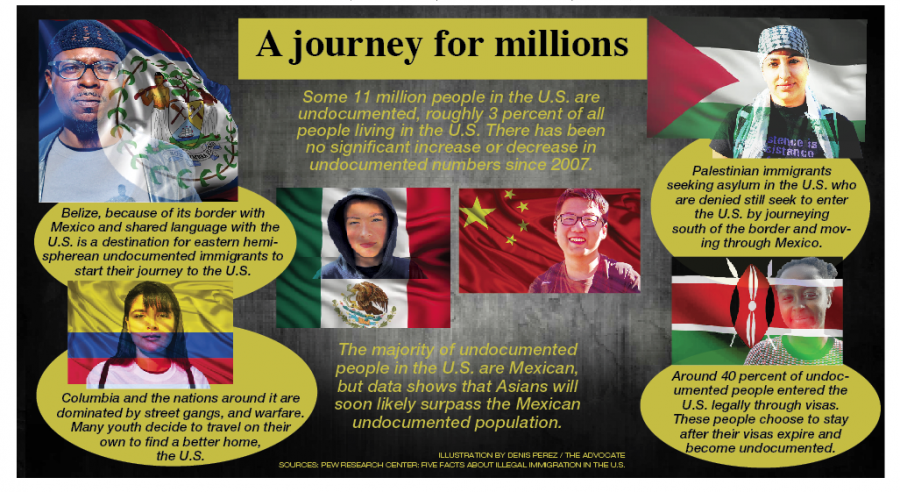Clean Dream Act protects immigrants
Dec 8, 2017
The Deferred Action for Childhood Arrivals (DACA) program is approaching its termination date and Democratic Congressional leaders are pushing for the passage of the clean Dream Act of 2017, a program that would establish a pathway to citizenship for over 2.1 million undocumented immigrants.
The clean Dream Act calls for no additional border security, no mass deportation and criminalization of immigrant communities, no more detention centers, no mandatory E-verification and a U.S. Citizenship and Immigration Services (USCIS) website that allows businesses to see if their employees are authorized to work legally in the United States.
“There will be no inhumane bargaining deals like funding for the border wall and private prisons for detained immigrants and no surveillance,” Contra Costa College economics major Oscar Martinez said.
President Donald Trump continues to push for his border wall and thousands of deportations, according to the United States Department of Justice.
DACA is set to end March 5, and the clean Dream Act may be the “only resolution that makes sense,” Martinez, who is also active on campus in the CCC Puente Club, said.
DACA was a program created by former President Barrack Obama’s administration on June 15, 2012, giving eligible undocumented immigrants who came to the United States when they were under the age of 16 a two-year renewable work permit and exemption from deportation.
When Trump announced the end of DACA on Sept. 5, he gave Congress six months to establish permanent legislation solution that extends protection to the 800,000 undocumented immigrants.
Approximately 1,400 people will lose their ability to work per day and until everyone’s work permits expire (by October 2019), according to a report from Center of American Progress. This could result in 30,000 people losing their jobs per month.
CCC’s La Raza Student Union President Ricardo Sanchez said undocumented students who applied for DACA had to pay the $495 application fee just to earn their right to work and not get deported.
“We work, we pay our taxes, and have contributed to this society. But we never see anything back,” Sanchez said.
According to the Center for American Progress, 91 percent of DACA recipients have jobs and contribute billions of revenue to the economy.
The clean Dream Act paves a path for students who have contributed to the U.S. throughout their many years here.
“I’ve been an American my whole life, but just because of a document it doesn’t show that I am,” Sanchez said.
Martinez said, “A clean Dream Act provides protection to law abiding, tax paying immigrant youth, which is really what Republicans should see from us, not whether we are assimilating or where we were born.”
Those who would qualify for the clean Dream Act would have entered the U.S. before reaching 18 years old, have been in U.S. for 4 years and can pass a background check, according to the National Immigration Law Center (NILC).
Qualifying applicants would first qualify for conditional permanent residence by working, joining the military, earning a higher education degree or meeting a “hardship exception.”
After eight years, they would obtain lawful permanent resident status (LPR), and after five years in LPR status, they will be eligible to apply for citizenship and those who qualified for DACA would be on a “faster track” to citizenship, according to the NILC.
The clean Dream Act would provide a permanent solution for the hundreds of permits ending, Sanchez said.
“The clean Dream Act is not only for DACA students, but also for our parents. When people call me a Dreamer, I don’t feel like a Dreamer because I was just brought here.”
Sanchez said he parents are the real Dreamers because they are the ones who had dreams for Sanchez and his little brother to have a better life in the U.S.
La Raza studies major Luis Ledesma’s work permit comes to an end summer 2018. He was one of the thousands who renewed before the Oct. 5 window provided by the (USCIS) when DACA was rescinded on Sept. 5.
“I want to stay here and build a future with my family,” Ledesma said.
Passing a clean Dream Act means that undocumented communities will have access to relief and protection from deportation.
“If it does not pass, millions of undocumented families will be vulnerable and subject to deportation,” Ledesma said.
The Dream Act was formerly known as the Development, Relief and Education for Alien Minors Act and was introduced in 2001. The act was never passed, but would have granted qualifying undocumented immigrants permanent residency.
After several attempts, the California Dream Act of 2011 was signed by Governor Jerry Brown.
It included Assembly Bill 130 and Assembly Bill 131.
These assembly bills allow undocumented students to receive scholarships to UC campuses and the Cal Grant.




Don Honda • Dec 9, 2017 at 8:44 am
An Atlantic Monthly article that shows that most economists’ thinking that an increased influx of immigrants provides more jobs for Americans is FALSE and does harm jobs for US workers and the economy:
http://www.theatlantic.com/business/archive/2015/01/does-immigration-harm-working-americans/384060/
http://query.nytimes.com/gst/fullpage.html?res=990DEFDC1430F934A15750C0A9609C8B63
http://krugman.blogs.nytimes.com/2006/03/27/notes-on-immigration/
The Conscience Of A Liberal–Paul Krugman
“First, the benefits of immigration to the population already here are small.”
” But as Mr. Hanson explains in his paper, reasonable calculations suggest that we’re talking about very small numbers, perhaps as little as 0.1 percent of GDP.
“My second negative point is that immigration reduces the wages of domestic workers who compete with immigrants. That’s just supply and demand…
“Finally, the fiscal burden of low-wage immigrants is also pretty clear. ”
Also, it is patently untrue that “immigrants” are the solution to low rate of start-ups:
http://smallbiztrends.com/2015/01/immigration-reform-declining-start-rate.html
Don Honda • Dec 9, 2017 at 8:44 am
Is this what to expect from DREAMers?:
http://www.sandiegouniontribune.com/opinion/commentary/sdut-ruben-navarrette-one-dreamers-missed-lesson-2015jun24-story.html
Ruben Navarrette: One Dreamer’s missed lesson in good character
And just who is the typical DREAMer?
http://www.chicagotribune.com/news/opinion/commentary/ct-perspec-dreamers-daca-narrative-0914-story.html
Don’t buy into all of that rosy PR about DACA